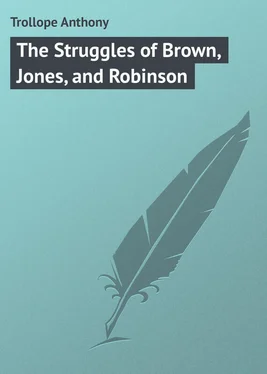Anthony Trollope - The Struggles of Brown, Jones, and Robinson
Здесь есть возможность читать онлайн «Anthony Trollope - The Struggles of Brown, Jones, and Robinson» — ознакомительный отрывок электронной книги совершенно бесплатно, а после прочтения отрывка купить полную версию. В некоторых случаях можно слушать аудио, скачать через торрент в формате fb2 и присутствует краткое содержание. Жанр: foreign_prose, Юмористическая проза, foreign_language, на английском языке. Описание произведения, (предисловие) а так же отзывы посетителей доступны на портале библиотеки ЛибКат.
- Название:The Struggles of Brown, Jones, and Robinson
- Автор:
- Жанр:
- Год:неизвестен
- ISBN:нет данных
- Рейтинг книги:5 / 5. Голосов: 1
-
Избранное:Добавить в избранное
- Отзывы:
-
Ваша оценка:
- 100
- 1
- 2
- 3
- 4
- 5
The Struggles of Brown, Jones, and Robinson: краткое содержание, описание и аннотация
Предлагаем к чтению аннотацию, описание, краткое содержание или предисловие (зависит от того, что написал сам автор книги «The Struggles of Brown, Jones, and Robinson»). Если вы не нашли необходимую информацию о книге — напишите в комментариях, мы постараемся отыскать её.
The Struggles of Brown, Jones, and Robinson — читать онлайн ознакомительный отрывок
Ниже представлен текст книги, разбитый по страницам. Система сохранения места последней прочитанной страницы, позволяет с удобством читать онлайн бесплатно книгу «The Struggles of Brown, Jones, and Robinson», без необходимости каждый раз заново искать на чём Вы остановились. Поставьте закладку, и сможете в любой момент перейти на страницу, на которой закончили чтение.
Интервал:
Закладка:
Trollope Anthony
The Struggles of Brown, Jones, and Robinson / By One of the Firm
CHAPTER I
PREFACE
BY ONE OF THE FIRM
It will be observed by the literary and commercial world that, in this transaction, the name of the really responsible party does not show on the title-page. I – George Robinson – am that party. When our Mr. Jones objected to the publication of these memoirs unless they appeared as coming from the firm itself, I at once gave way. I had no wish to offend the firm, and, perhaps, encounter a lawsuit for the empty honour of seeing my name advertised as that of an author. We had talked the matter over with our Mr. Brown, who, however, was at that time in affliction, and not able to offer much that was available. One thing he did say; "As we are partners," said Mr. Brown, "let's be partners to the end." "Well," said I, "if you say so, Mr. Brown, so it shall be." I never supposed that Mr. Brown would set the Thames on fire, and soon learnt that he was not the man to amass a fortune by British commerce. He was not made for the guild of Merchant Princes. But he was the senior member of our firm, and I always respected the old-fashioned doctrine of capital in the person of our Mr. Brown.
When Mr. Brown said, "Let's be partners to the end; it won't be for long, Mr. Robinson," I never said another word. "No," said I, "Mr. Brown; you're not what you was – and you're down a peg; I'm not the man to take advantage and go against your last wishes. Whether for long or whether for short, we'll pull through in the same boat to the end. It shall be put on the title-page – 'By One of the Firm.'" "God bless you, Mr. Robinson," said he; "God bless you."
And then Mr. Jones started another objection. The reader will soon realize that anything I do is sure to be wrong with Mr. Jones. It wouldn't be him else. He next declares that I can't write English, and that the book must be corrected, and put out by an editor? Now, when I inform the discerning British Public that every advertisement that has been posted by Brown, Jones, and Robinson, during the last three years has come from my own unaided pen, I think few will doubt my capacity to write the "Memoirs of Brown, Jones, and Robinson," without any editor whatsoever.
On this head I was determined to be firm. What! after preparing, and correcting, and publishing such thousands of advertisements in prose and verse and in every form of which the language is susceptible, to be told that I couldn't write English! It was Jones all over. If there is a party envious of the genius of another party in this sublunary world that party is our Mr. Jones.
But I was again softened by a touching appeal from our senior partner. Mr. Brown, though prosaic enough in his general ideas, was still sometimes given to the Muses; and now, with a melancholy and tender cadence, he quoted the following lines; —
"Let dogs delight to bark and bite,
For 'tis their nature to.
But 'tis a shameful sight to see, when partners of one firm like we,
Fall out, and chide, and fight!"
So I gave in again.
It was then arranged that one of Smith and Elder's young men should look through the manuscript, and make any few alterations which the taste of the public might require. It might be that the sonorous, and, if I may so express myself, magniloquent phraseology in which I was accustomed to invite the attention of the nobility and gentry to our last importations was not suited for the purposes of light literature, such as this. "In fiction, Mr. Robinson, your own unaided talents would doubtless make you great," said to me the editor of this Magazine; "but if I may be allowed an opinion, I do think that in the delicate task of composing memoirs a little assistance may perhaps be not inexpedient."
This was prettily worded; so what with this, and what with our Mr. Brown's poetry, I gave way; but I reserved to myself the right of an epistolary preface in my own name. So here it is.
Ladies and Gentlemen, – I am not a bit ashamed of my part in the following transaction. I have done what little in me lay to further British commerce. British commerce is not now what it was. It is becoming open and free like everything else that is British; – open to the poor man as well as to the rich. That bugbear Capital is a crumbling old tower, and is pretty nigh brought to its last ruin. Credit is the polished shaft of the temple on which the new world of trade will be content to lean. That, I take it, is the one great doctrine of modern commerce. Credit, – credit, – credit. Get credit, and capital will follow. Doesn't the word speak for itself? Must not credit be respectable? And is not the word "respectable" the highest term of praise which can be applied to the British tradesman?
Credit is the polished shaft of the temple. But with what are you to polish it? The stone does not come from the quarry with its gloss on. Man's labour is necessary to give it that beauteous exterior. Then wherewith shall we polish credit? I answer the question at once. With the pumice-stone and sand-paper of advertisement.
Different great men have promulgated the different means by which they have sought to subjugate the world. "Audacity – audacity – audacity," was the lesson which one hero taught. "Agitate – agitate – agitate," was the counsel of a second. "Register – register – register," of a third. But I say – Advertise, advertise, advertise! And I say it again and again – Advertise, advertise, advertise! It is, or should be, the Shibboleth of British commerce. That it certainly will be so I, George Robinson, hereby venture to prophesy, feeling that on this subject something but little short of inspiration has touched my eager pen.
There are those, – men of the old school, who cannot rouse themselves to see and read the signs of the time, men who would have been in the last ranks, let them have lived when they would, – who object to it that it is untrue, – who say that advertisements do not keep the promises which they make. But what says the poet, – he whom we teach our children to read? What says the stern moralist to his wicked mother in the play? "Assume a virtue if you have it not?" and so say I. "Assume a virtue if you have it not." It would be a great trade virtue in a haberdasher to have forty thousand pairs of best hose lying ready for sale in his warehouse. Let him assume that virtue if he have it not. Is not this the way in which we all live, and the only way in which it is possible to live comfortably. A gentleman gives a dinner party. His lady, who has to work all day like a dray-horse and scold the servants besides, to get things into order, loses her temper. We all pretty well know what that means. Well; up to the moment when she has to show, she is as bitter a piece of goods as may be. But, nevertheless, she comes down all smiles, although she knows that at that moment the drunken cook is spoiling the fish. She assumes a virtue, though she has it not; and who will say she is not right?
Well; I say again and again to all young tradesmen; – Advertise, advertise, advertise; – and don't stop to think too much about capital. It is a bugbear. Capital is a bugbear; and it is talked about by those who have it, – and by some that have not so much of it neither, – for the sake of putting down competition, and keeping the market to themselves.
There's the same game going on all the world over; and it's the natural game for mankind to play at. They who's up a bit is all for keeping down them who is down; and they who is down is so very soft through being down, that they've not spirit to force themselves up. Now I saw that very early in life. There is always going on a battle between aristocracy and democracy. Aristocracy likes to keep itself to itself; and democracy is just of the same opinion, only wishes to become aristocracy first.
Читать дальшеИнтервал:
Закладка:
Похожие книги на «The Struggles of Brown, Jones, and Robinson»
Представляем Вашему вниманию похожие книги на «The Struggles of Brown, Jones, and Robinson» списком для выбора. Мы отобрали схожую по названию и смыслу литературу в надежде предоставить читателям больше вариантов отыскать новые, интересные, ещё непрочитанные произведения.
Обсуждение, отзывы о книге «The Struggles of Brown, Jones, and Robinson» и просто собственные мнения читателей. Оставьте ваши комментарии, напишите, что Вы думаете о произведении, его смысле или главных героях. Укажите что конкретно понравилось, а что нет, и почему Вы так считаете.












